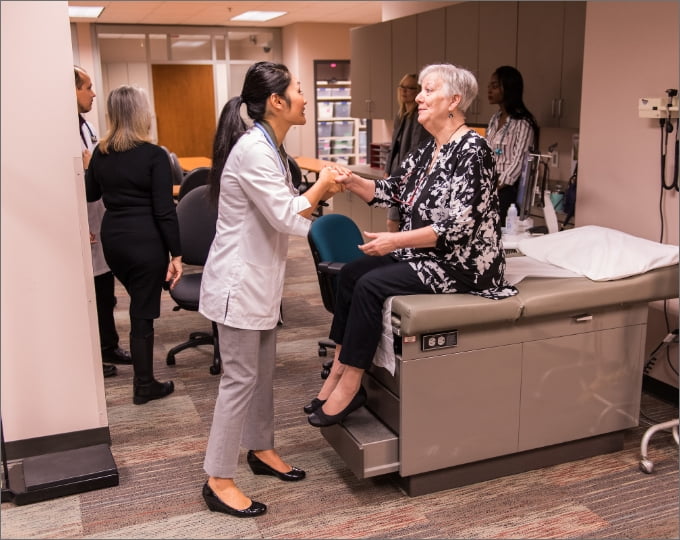
Current and Future Nursing Trends
May 1, 2025The nursing profession continues to evolve in response to changes in healthcare needs, technology, and workforce dynamics. As we navigate 2025 and beyond, several key nursing trends are shaping the present and future of the profession. Understanding these trends can help nurses and healthcare organizations prepare for the challenges and opportunities ahead.
Registered nurses (RNs) and nurse practitioners (NPs) contribute in patient care roles across diverse specialties and healthcare settings. The organizations referenced throughout this blog highlight key areas where nurses can grow their expertise, influence healthcare policy, and explore career advancements aligned with the evolving landscape of nursing.
Nursing Trend #1: Increased Demand for Nurses
The demand for nurses continues to rise, driven by multiple factors, including a growing aging population requiring more healthcare services and increased prevalence of chronic illnesses. These current nursing trends are creating a favorable job outlook for registered nurses (RNs) across the country with U.S. Bureau of Labor Statistics (BLS) projections indicating a steady job growth rate of 6% for RNs from 2023 to 2033.
Likewise, the BLS also reports significantly increased demand for advanced practice registered nurses (APRNs) to meet primary care needs. Employment of nurse practitioners is expected to grow 40% over the decade from 2023 to 2033. Several key factors are driving this increase:
- Growing need for preventive and primary care
- Rising elderly population with complex health issues
- Increase in chronic and acute conditions
- Expansion of team-based healthcare delivery
- More autonomy through evolving state laws
- Broader public trust in APRNs as healthcare providers
To meet the challenges associated with a nursing workforce shortage, nursing schools and healthcare institutions are also expanding enrollment opportunities, offering scholarships, and creating accelerated programs to bring more qualified nurses into the field as quickly as possible.
Nursing Trend #2: Expansion of Telehealth and Remote Patient Monitoring
Telehealth has become an integral part of healthcare delivery, allowing nurses to provide virtual patient care, monitor chronic conditions, and improve access to healthcare, particularly in rural areas. News and guidelines on telehealth shared by the American Telemedicine Association (ATA) encourage the continued integration of remote patient monitoring devices and artificial intelligence (AI) with goals to further enhance nursing efficiency and patient outcomes.
Telehealth now includes:
- Virtual doctor visits for primary and specialty care
- Remote patient monitoring for chronic disease management
- Mental health counseling
- Post-surgical follow-ups
For nurses, this shift means greater involvement in managing patients from a distance, using data from wearable devices and mobile health apps to make real-time care decisions. In addition to benefiting patients, telehealth offers more flexibility for nurses, allowing them to work remotely or take on hybrid roles that balance in-person and virtual care.

Nursing Trend #3: Emphasis on Holistic and Preventive Care
There is a growing shift toward holistic and preventive care, focusing on wellness, lifestyle modifications, and early interventions. Nurses are increasingly involved in patient education, chronic disease management, and interdisciplinary collaboration to improve population health and reduce hospital admissions.
The Centers for Disease Control and Prevention (CDC) provides information on preventive care and emphasizes that preventive services like vaccinations, screenings, and health education can reduce healthcare costs and improve overall public health.
Preventive care initiatives are also expanding within communities. Public health nurses, school nurses, and community health workers are leading efforts to educate populations about disease prevention and health maintenance, further solidifying the nursing profession’s impact beyond traditional clinical settings.
- Also read: Holistic Care in Nursing
Nursing Trend #4: Advancements in Nursing Education and Training
With the evolving healthcare landscape, nursing education is adapting to better prepare nurses for complex patient needs. Simulation-based learning, continuing education, and advanced degree programs are becoming more accessible, helping nurses gain specialized skills in areas such as critical care, geriatrics, and palliative care.
The American Association of Colleges of Nursing (AACN) highlights new educational approaches designed to prepare nurses for today’s complex healthcare environment.
Key developments in nursing education include:
The recent changes in nursing practice diversity described below are a bright spot in nursing. But AACN and other nursing leaders believe more work is needed to achieve adequate representation.
- Simulation-based learning with lifelike patient mannequins
- Increased availability of online and hybrid degree programs
- Competency-based education focusing on skill proficiency
These advancements ensure that nurses graduate with the practical abilities needed to succeed in modern healthcare environments rather than just theoretical nursing knowledge.

Nursing Trend #5: Growth of Nurse Leadership and Advocacy Roles
Nurses are taking on greater leadership roles within healthcare systems, influencing policy changes, and advocating for patient rights. As nursing trends continue to evolve, more nurses are driving policy changes and influencing healthcare decision-making at both local and national levels.
The American Nurses Association (ANA) recognizes these future nursing trends with resources to support developing leaders. Nursing mentorship programs are also becoming more common, pairing experienced nurses with newer professionals to help them navigate career challenges, develop leadership skills, and gain confidence in their roles.
Nursing Trend #6: Workforce Challenges and Burnout Prevention
Nurse burnout has been a persistent issue, but organizations are taking steps to improve work-life balance and mental health support. The National Academies (Science, Engineering, and Medicine) highlight the importance of addressing workload stress to retain skilled healthcare workers with efforts to prevent burnout that include:
- Limiting mandatory overtime
- Improving staff-to-patient ratios
- Providing mental health resources tailored to healthcare workers
- Introducing wellness programs and peer support groups
A more supportive work environment not only benefits nurses but also enhances patient care quality. Rested and emotionally supported nurses are better equipped to deliver compassionate, effective care.
- Read more about Self-care for Nurses: Tips and Strategies to Avoid Burn-out
Nursing Trend #7: Integration of AI and Data-Driven Nursing
Artificial intelligence and data analytics are transforming nursing practice by assisting with clinical decision-making, predicting patient deterioration, and optimizing workflow efficiency. Nurses who develop data literacy and technological proficiency will be better positioned for future nursing trends in healthcare.
The Healthcare Information and Management Systems Society (HIMSS) reports that AI and data analytics are enhancing clinical decision-making and operational efficiency. Artificial intelligence applications currently used in nursing include:
- Predictive analytics that anticipate patient deterioration
- Automated documentation systems that reduce administrative burdens
- AI-powered virtual assistants helping nurses manage tasks and communication
While AI is not a replacement for human judgment and compassion, it serves as a valuable tool that allows nurses to focus more on direct patient care. As AI technology continues to develop, nurses who are proficient in data analysis and tech-driven healthcare solutions will find themselves at the forefront of modern nursing practice.
Honoring Nurses and Their Vital Role
As we celebrate Nurses Month, it’s essential to recognize the institutions that are preparing nurses for the challenges of tomorrow. Texas Woman’s University (TWU) is a leader in nursing education, offering programs designed to equip nurses with the skills and knowledge needed to thrive in our rapidly evolving healthcare landscape.
TWU is dedicated to shaping nurses who are not only expert clinicians but also influential leaders, capable of driving innovation in patient care and healthcare systems. As you consider your future along with these nursing trends, now is the perfect time to explore opportunities for growth and new career paths. Let’s take a closer look at how the nursing faculty at TWU are preparing graduates to make a lasting impact in healthcare.
Shaping the Future of Nursing with Texas Woman’s University
The Master of Science in Nursing (MSN) Family Nurse Practitioner (FNP) program at Texas Woman’s University provides a comprehensive foundation for nurses aspiring to become advanced practitioners. By combining theoretical knowledge with practical skills, students are equipped to provide high-quality care and lead initiatives that improve patient outcomes.
Key features of TWU's online MSN-FNP program include:
- 100% online coursework, providing flexibility for working nurses
- Affordable tuition with financial aid options
- Experienced faculty offering expert guidance and mentorship
- Robust clinical placement support to ensure practical experience
If you’re looking to advance your career and make a meaningful impact on the future of nursing, explore the MSN-FNP program at Texas Woman’s University today. Join a community of dedicated professionals who are shaping the future of nursing and setting new standards of excellence in patient care.
About TWU
Since 1901, Texas Woman's University (TWU) has provided an educational foundation that prepares its male and female students for a successful future, both personally and professionally. One of the nation's top nursing graduate programs, the online Master of Science in Nursing – Family Nurse Practitioner (FNP) at Texas Woman’s University, prepares practicing RNs with a BSN to become holistic primary care providers. Designed for working nurses, the online FNP offers a contemporary curriculum that is aligned with the latest standards.
Texas Woman University's graduates are prepared to deliver high-quality nursing in a variety of work settings across Texas and 29 other states. To learn more and to increase your career possibilities, salary potential, and job outlook as an FNP, visit the online MSN-FNP program page.

